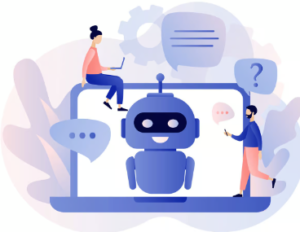
Artificial Intelligence (AI) has become a driving force in revolutionizing customer service, offering companies new ways to engage with customers, solve problems, and enhance overall experiences. From AI-powered chatbots to sophisticated data analytics, businesses are harnessing the power of AI to provide faster, more efficient, and personalized customer support. In this blog post, we will explore how AI is reshaping customer service, the benefits it brings, and the future it promises for businesses and consumers alike.
1. AI-Powered Chatbots and Virtual Assistants
One of the most visible applications of AI in customer service is the rise of AI-powered chatbots and virtual assistants. These intelligent systems are designed to interact with customers in real-time, providing instant responses to inquiries, guiding users through processes, and solving common issues without the need for human intervention.
AI chatbots leverage natural language processing (NLP) and machine learning to understand and respond to customer queries in a human-like manner. They can handle a wide range of tasks, from answering FAQs and providing product information to processing orders and assisting with troubleshooting. For example, an e-commerce website might use a chatbot to help customers track their orders, initiate returns, or even offer personalized product recommendations based on previous purchases.
Virtual assistants take this a step further by offering more advanced support. Unlike basic chatbots, virtual assistants can handle complex queries, recognize context, and engage in more natural and meaningful conversations. For instance, AI assistants like Apple’s Siri or Amazon’s Alexa can help customers with tasks beyond customer service, such as setting reminders, controlling smart home devices, and more.
also read:]Future of AI in Education and Learning
2. 24/7 Customer Support
One of the most significant advantages of AI in customer service is its ability to provide round-the-clock support. Unlike human agents, AI systems do not require breaks or sleep, making them ideal for delivering consistent customer support at any time of the day or night. This 24/7 availability is particularly beneficial for businesses that operate globally, as it ensures that customers in different time zones can receive assistance whenever they need it.
This constant availability can lead to improved customer satisfaction, as customers no longer have to wait for business hours to get their issues resolved. For example, if a customer has a question about their account at 2 a.m., an AI-powered chatbot can provide an instant response, improving the overall customer experience and building trust in the brand.
also read:The Future of Personalized Recommendations: How AI is Transforming Choices
3. Personalized Customer Interactions
AI has the ability to analyze vast amounts of customer data to offer personalized interactions tailored to individual preferences and behaviors. By leveraging data analytics and machine learning algorithms, AI can identify patterns and trends in customer behavior, allowing businesses to understand their customers better and provide more relevant support.
For instance, AI can analyze a customer’s past interactions, purchase history, and browsing behavior to provide personalized product recommendations or tailored solutions. If a customer frequently contacts customer support for a specific issue, the AI system can proactively offer solutions before the customer even asks. This level of personalization not only improves the customer experience but also increases the likelihood of customer loyalty and repeat business.
also read:Top 10 AI Applications Transforming Everyday Life
4. Enhanced Self-Service Options
AI is also empowering customers to resolve issues on their own through enhanced self-service options. Self-service portals, powered by AI, enable customers to find answers to their questions and resolve problems without the need for human assistance. These portals often include features such as interactive FAQs, knowledge bases, and guided troubleshooting tools.
AI enhances these self-service options by making them more intuitive and responsive. For example, an AI-driven knowledge base can use natural language processing to understand customer queries and provide the most relevant articles or solutions. AI can also analyze customer interactions with the self-service portal to identify common pain points and improve the content and structure of the support resources over time.
By offering robust self-service options, businesses can reduce the volume of support tickets and free up human agents to focus on more complex or high-priority issues. This not only streamlines the customer support process but also empowers customers to take control of their own experience.
also read:Top 10 AI Applications Transforming Everyday Life
5. Predictive Customer Support
Predictive customer support is an emerging area where AI is making a significant impact. By analyzing customer data and behavior, AI can predict potential issues before they arise and offer proactive solutions. This capability can transform customer service from a reactive process into a proactive one, allowing businesses to address problems before they escalate.
For example, AI can monitor a customer’s usage patterns of a product or service and identify signs of potential issues, such as a sudden drop in usage or recurring errors. The system can then automatically reach out to the customer with a solution or escalate the issue to a human agent for further assistance. This proactive approach not only prevents customer frustration but also demonstrates a commitment to customer satisfaction.

6. Automating Routine Tasks
AI in customer service is highly effective in automating routine and repetitive tasks, allowing human agents to focus on more complex and emotionally nuanced interactions. For example, AI can handle tasks such as sorting and categorizing incoming support tickets, routing them to the appropriate department or agent, and providing initial responses to common inquiries.
This automation speeds up the customer support process, reduces response times, and ensures that customers receive timely assistance. By offloading routine tasks to AI, human agents can dedicate their time and expertise to resolving complex issues, improving overall efficiency and customer satisfaction.
also read:The Future of AI Virtual Assistants and Home Modernization
7. Sentiment Analysis for Improved Customer Experience
Sentiment analysis is another powerful application of AI in customer service. AI algorithms can analyze customer interactions, such as emails, chat conversations, and social media posts, to gauge the customer’s sentiment—whether they are satisfied, frustrated, or unhappy. By understanding the emotional tone of customer interactions, businesses can tailor their responses to better meet customer needs.
For example, if an AI system detects that a customer is expressing frustration or dissatisfaction in a chat conversation, it can escalate the issue to a human agent for more personalized attention. Sentiment analysis helps businesses identify potential problems early, enabling them to take corrective actions and improve the overall customer experience.
8. The Future of AI in Customer Service
The future of AI in customer service is poised to bring even more advanced and sophisticated capabilities. As AI technology continues to evolve, we can expect further integration with emerging technologies such as augmented reality (AR) and virtual reality (VR) to create immersive customer support experiences. For example, customers might use AR-powered virtual assistants to receive real-time guidance on product assembly or troubleshooting.
Additionally, AI’s growing ability to understand and interpret human emotions through advanced sentiment analysis and emotional AI will enable even more empathetic and human-like interactions. This evolution will help bridge the gap between AI and human agents, providing a seamless and highly personalized customer support experience.
Conclusion
AI is transforming customer service by offering faster, more efficient, and personalized support. From AI-powered chatbots and virtual assistants to predictive customer support and sentiment analysis, AI is enhancing every aspect of the customer experience. By automating routine tasks, providing 24/7 support, and offering personalized interactions, AI enables businesses to meet and exceed customer expectations in a competitive landscape.
As AI continues to evolve, it will unlock new possibilities for customer service, making it more intuitive, proactive, and responsive. The fusion of AI and human expertise promises a future where customer service is not just about solving problems but about creating meaningful and lasting customer relationships.
also read:Cleantech startup ReCircle raises bridge round
visit
: gamicaltech.com ai in customer service
